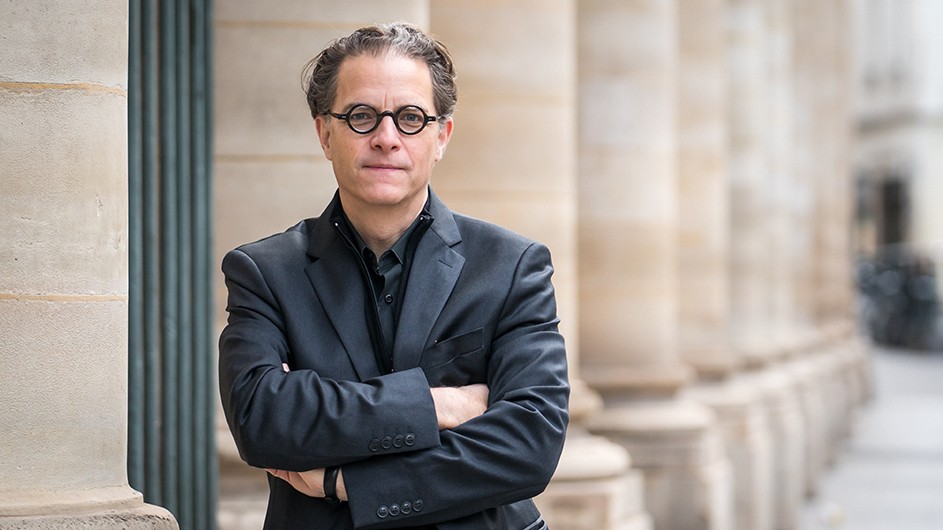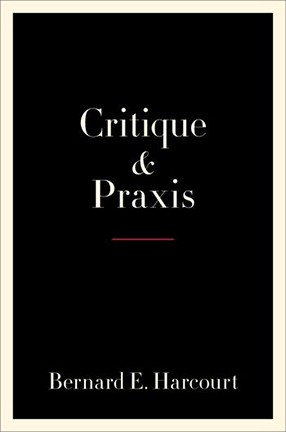A New Book Challenges Us to Turn Contemplation Into Action in This Time of Crisis
In Critique & Praxis, Bernard E. Harcourt explains how to become engaged citizens.

Critical philosophy has always challenged the division between theory and practice. At its best, the movement aims to turn contemplation into action, seeking to transform society in pursuit of equality and autonomy.
In his new book, Critique and Praxis, Columbia Law School Professor Bernard E. Harcourt compels us to move beyond decades of philosophical detours and to harness critical thought to the need for action. Columbia News asked Harcourt about the book and its relevance in this season of a pandemic and protests, as well as how he is keeping his students engaged while they are learning remotely.
Q. How did you come up with the idea for this book?
A. The times of crisis that we live in, to be frank—that’s what compelled me to write this book. I urgently felt that these crises—global climate change, the rise of authoritarianism in this country, the endless war on terror—call on each and every one of us to address the question: How can we achieve a just society? I originally drafted a shorter first version and published it online in an innovative open access, open review format. But the book needed more work, and I felt that I had to debate the current crises and find ways to address them, especially after the 2016 presidential election.
When I wrote that first draft, I was convinced that we all needed to tell each other our answers to the question, “What is to be done?” Over time, I realized that I could not go around telling others “what must be done.” We are far too aware of relations of power today, and live in a far more self-reflective time. And so, as someone who has litigated death penalty cases and been involved in social movements for decades, I ultimately transformed the inquiry, and turned it back onto myself by asking instead, “What more am I to do?” The result is a much longer, 700-page book, and more autobiographical than I had expected. But it does, ultimately, push hard on our shared responsibility for action. And that, I think, is essential.

Q. In the book, what are some of the steps you outline for moving beyond philosophical contemplation toward a practical call to action?
A. It is precisely that turn to the self, to posing the question not in terms of what others should do, but in terms of what each one of us individually should ask ourselves to do. That step, I believe, gets us beyond mere philosophical contemplation. This way, we also avoid lecturing others, or telling them what to do, which is intolerable today. By recasting the question in a far more reflexive way—entirely in keeping with these philosophical times—I believe we can turn critical thought into action.
Q. Do you see Critique and Praxis as being even more relevant now during the pandemic and this summer's racial/social justice protests?
A. Absolutely. I discuss at length in the book the #BlackLivesMatter movement—how remarkable, innovative, and energizing it has been. But Critique and Praxis was written before the new wave of protests following the murders of George Floyd, Breonna Taylor, Carlos Ingram-Lopez, and so many other persons of color. It was written before we saw, once again, the devastating and disproportionate toll of catastrophes (like the pandemic) on persons of color. So the recent ongoing crises, the pandemic, the failure of accountability in the death of Breonna Taylor—all of those accentuate the need, more than ever, to revitalize a critical philosophy of action.
Q. What are you teaching this semester?
A. Both of my courses are about abolition, about the movements for the abolition of the police, of prisons, of capital punishment, and, beyond that, the abolition of borders and fossil fuels. One course is a more philosophical, year-long seminar series called Abolition 13/13, which we kicked off on September 24th with remarkable musical performances, poetry, and artwork by artists who are or were formerly incarcerated, as well as contributions by several abolitionist groups from around Columbia. The other course I am co-teaching with the brilliant Alexis Hoag, who joined Columbia from the NAACP Legal Defense Fund: Abolition: A Social Justice Practicum, where we work on abolitionist litigation and strategies.
Q. Do you think it's hard to keep students learning remotely engaged?
A. Yes and no, really. We’ve all got Zoom fatigue, and that’s not making things easy. But on the other hand, we all, including our students, are craving intellectual exchange and community—and our remote learning does a pretty good job of creating those. Not perfect. And, I hope, not lasting. I hope we can return to the physicality of the classroom and leave behind these technologies. But they are pretty good in a pinch.
Q. Are there any pedagogical innovations for Zoom teaching that you have produced?
A. I’m not sure I would go so far as to call them “innovations,” but I do try to stir things up a bit and keep things moving fast. I keep conversations going, or bring in different speakers, because I think we start losing students when the discussion drags on or slows down, or when we are wasting a lot of time fixing the technology, telling people to “unmute,” etc. Because of social media, I think we have all become accustomed to shorter, more punctual, active screen time. So I try, as much as possible, to keep everyone’s attention by being nimble.
Q. What's the last great book you read?
A. Funny you should ask because books are, in a sense, the exact opposite of all this remote learning and screen time—at least for me, who loves physical books and not e-readers. I’d say W.E.B. Du Bois’s Black Reconstruction in America, 1860-1880. I reread the book over the past few weeks in preparation for our upcoming seminar discussion on Abolition Democracy, and I have to say, Black Reconstruction is an extraordinary work on racial injustice in America. It was written in 1935, but it reads as if it addresses our present. It is a formidable work.
Q. What's on your reading list now?
A. I just received my friend and colleague Bill Worthen’s new book, Shakespeare, Technicity, Theatre, and I plan to read it cover to cover. I also just ordered and received my friend W.J.T. Mitchell’s new book, Mental Traveler: a Father, a Son, and a Journey Through Schizophrenia. I know it will be a difficult read because it involves the tragic death of his son, but I know that reading it will provide a healing moment.
Q. You're hosting a dinner party. Which three academics or scholars, dead or alive, would you invite and why?
A. Well, I’ll resist the hypothetical, and just say that I only wish I were still at the last dinner party I hosted before the pandemic forced us into quarantine and social isolation. As I recall, it was a dinner at Le Monde with two brilliant former PhD students from the University of Chicago, who are now professors, Diana Kim and Joseph Fischel, and we were talking about the future of critical theory, post-colonial theory, and queer theory. I would do anything to be back at Le Monde at that dinner table, surrounded in that warm, loud setting by other friends and colleagues in normal times!